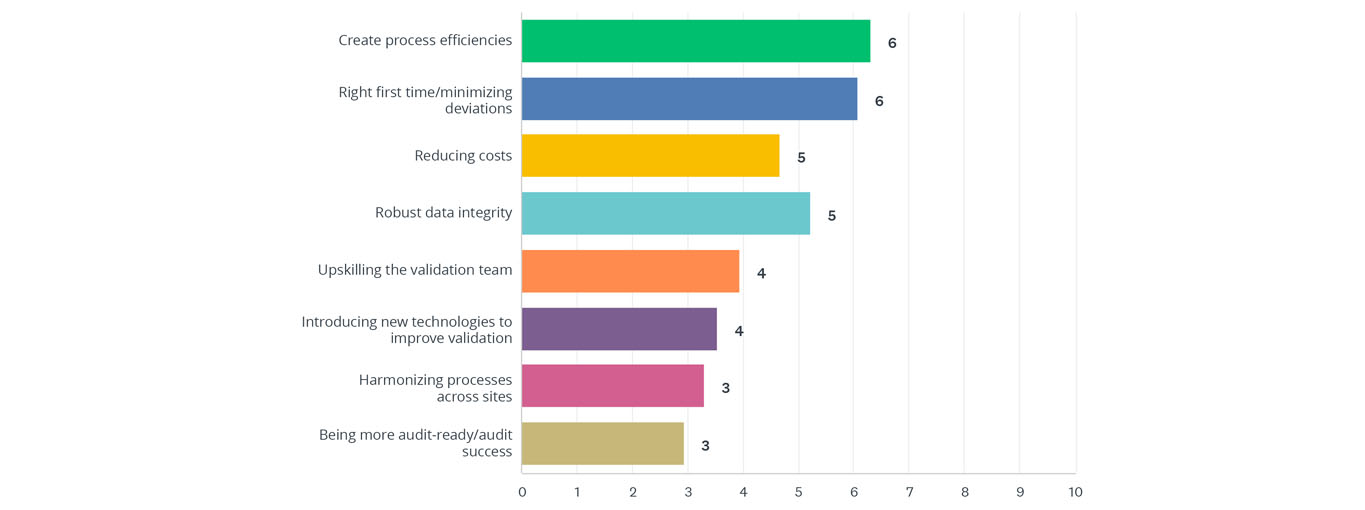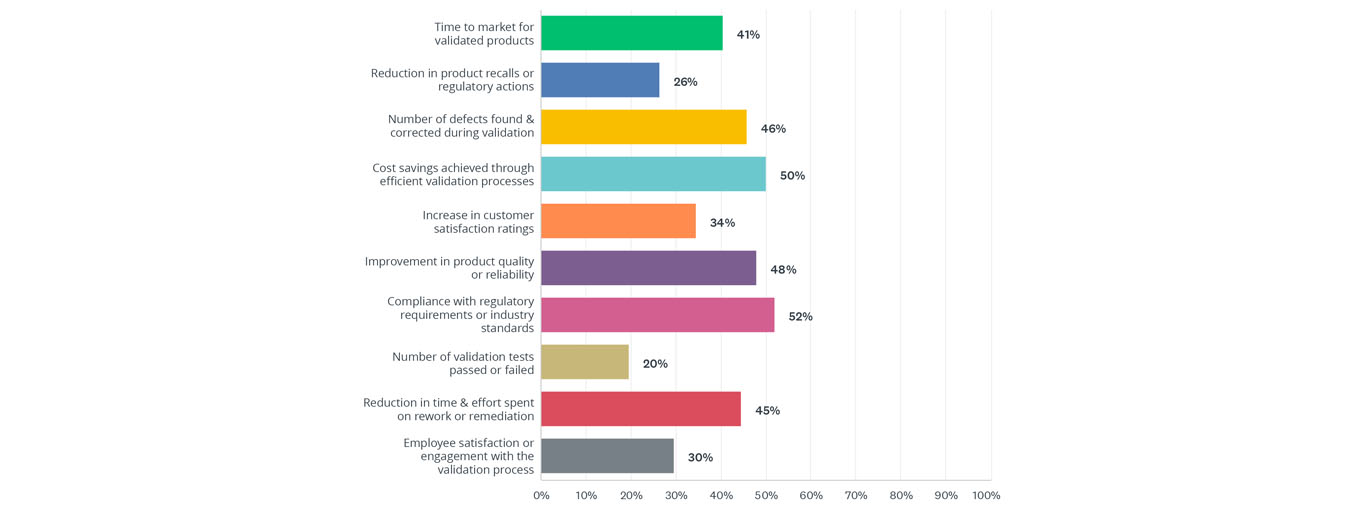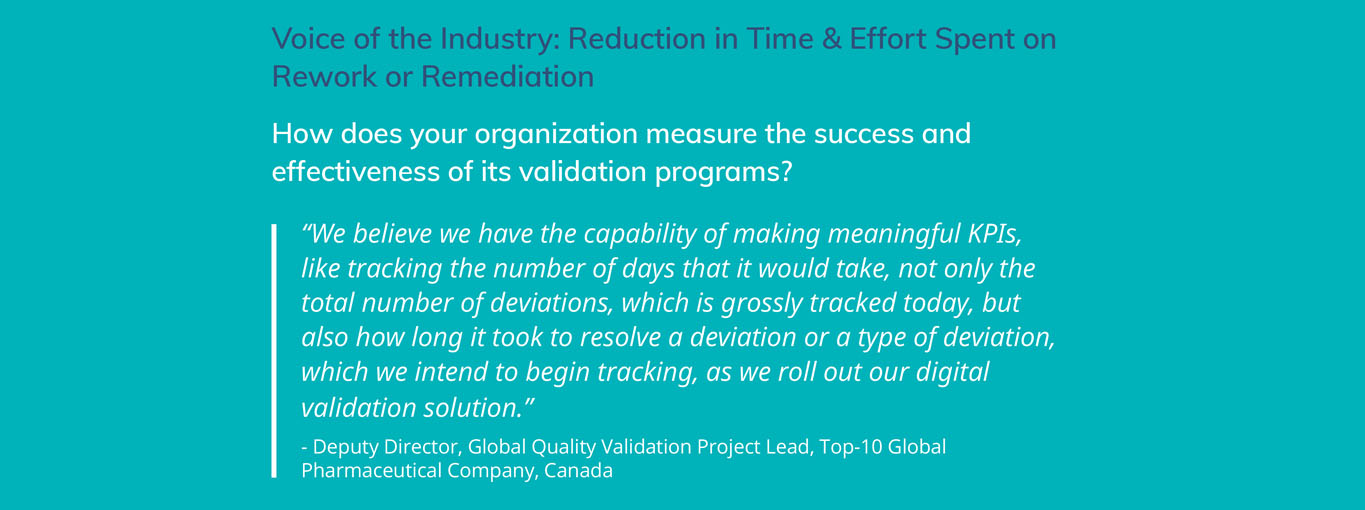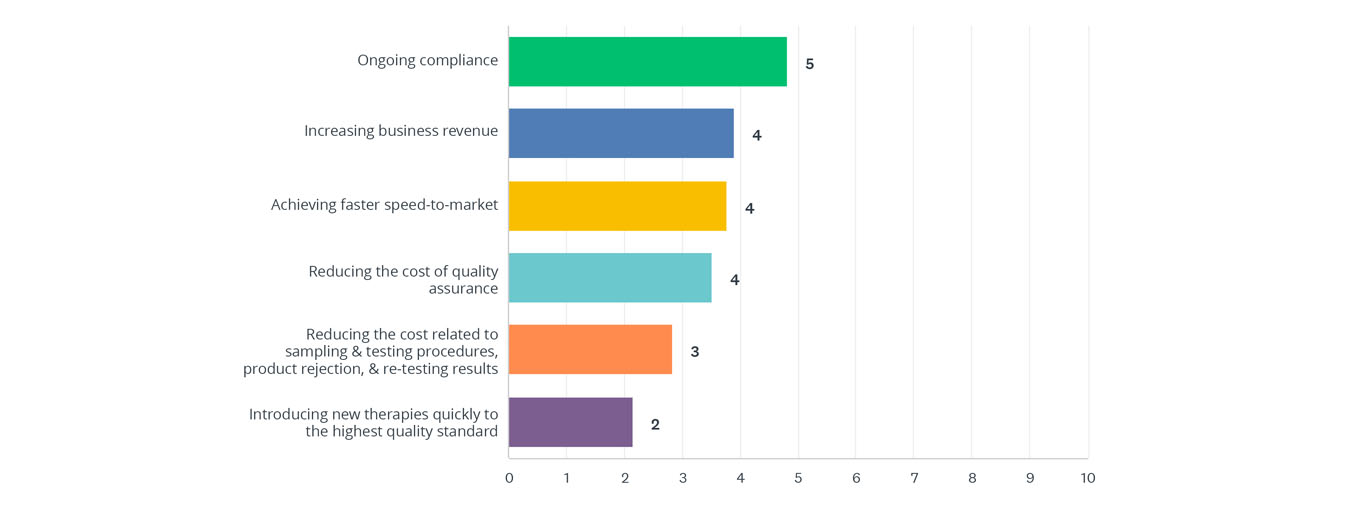As we step into 2025, the validation landscape is evolving rapidly, shaped by technological advancements, changing regulatory environments, and the ever-increasing importance of data integrity. Drawing insights from the 2024 State of Validation industry survey and report, validation professionals have identified three primary goals that will shape their focus in the coming year.
These goals not only reflect the current challenges faced by validation experts but also provide a roadmap for navigating the complexities of the industry. To better understand how market, technological, practice, and regulatory trends shape your industry, download the full 2024 State of Validation report now.
1. Create Process Efficiencies
The 2023 State of Validation industry survey and report highlight that “Create Process Efficiencies” stands out as the primary goal for organizations’ validation programs. This goal underscores the industry’s recognition of the need for streamlined and efficient validation processes.

Validation professionals in 2024 should prioritize initiatives aimed at optimizing their validation workflows and processes. This includes adopting automation tools, leveraging advanced technologies like artificial intelligence (AI) and machine learning (ML), and implementing digital validation systems that support and facilitate integrated processes. By doing so, organizations can achieve quicker turnaround times, reduced manual errors, and improved overall operational efficiency in their validation programs.
The focus on process efficiencies aligns with the second most prevalent Key Performance Indicator (KPI) identified by respondents: “Cost Savings Achieved Through Efficient Validation Processes.”

This focus reflects a strategic approach to validation that combines regulatory compliance with resource optimization. By focusing on these KPIs, organizations can drive continuous improvement, maintain compliance, and achieve higher levels of efficiency in their validation processes. They also may strengthen morale and enhance their ability to recruit and retain, since a third of respondents selected “Employee Satisfaction” and many of the other selections are drivers of job performance and motivation (like “Improving Product Quality”).
2. Right First Time/Minimizing Deviations
The second most prioritized goal according to the survey is “Right First Time/Minimizing Deviations.” This emphasizes the importance of accuracy and precision in validation processes. Poor validation performance can have significant repercussions, leading to non-compliance issues that necessitate corrective actions.

In 2024, validation professionals must focus on implementing measures to minimize deviations and ensure that validation processes are accurate from the outset. This involves investing in comprehensive training programs for validation teams, employing risk-based validation strategies, and utilizing advanced analytics to predict and prevent potential deviations.

Additionally, addressing this goal will directly impact the business strengths identified as most impacted by validation performance: “Ongoing Compliance,” “Increasing Business Revenue,” and “Achieving Faster Speed-to-Market.” By minimizing deviations and ensuring right-first-time validation, organizations can maintain ongoing compliance, avoid regulatory issues, and accelerate time-to-market for critical products and services.
3. Robust Data Integrity
Tied for third place in the survey, “Robust Data Integrity” is a critical goal for validation professionals in 2024. As organizations increasingly rely on data for decision-making and operational processes, ensuring the integrity of that data is paramount. In 2024 validation professionals should prioritize the development and implementation of comprehensive data management strategies.
Learn more about effective data integrity management through digitization in our on-demand webinar, presented by Darragh Boyle, Process Engineer and Digital Validation SME at Kneat.
Attend to learn:
- An introduction to data integrity topic & ALCOA+ principles: how they typically apply to a validation effort.
- Validation data integrity concerns in a traditional validation approach: how ALCOA+ principles have been traditionally handled on paper and associated risks.
- Data integrity best practice: how Kneat Gx seamlessly enables adherence to data integrity ALCOA+ principles through digital validation.
- A case study of a Kneat work process: demonstrating how design data changes can be tracked between design and test documents.
Addressing the goal of robust data integrity directly supports the business strengths identified in the survey. Maintaining data integrity is crucial for “Ongoing Compliance,” as data accuracy is often a key factor in regulatory adherence. Furthermore, it contributes to “Increasing Business Revenue” by providing accurate and reliable data for informed decision-making.
Final Thoughts
As validation professionals embark on the challenges of 2024, the goals of creating process efficiencies, achieving right-first-time validation, and ensuring robust data integrity emerge as key priorities. These goals not only reflect the industry’s current focus but also align with the most impactful business strengths and KPIs identified in the 2024 State of Validation report.
Achieving these primary goals can have a direct impact on business success by reducing operational costs, speeding up product development, and ensuring regulatory compliance, thereby enhancing the organization’s competitive advantage in the market. Organizations should strategically allocate resources and investments to address these primary goals effectively. This may involve adopting new technologies, investing in training and upskilling validation teams, and implementing robust validation data management systems.
By strategically addressing these goals, validation professionals can navigate the evolving landscape, contribute to organizational success, and position themselves as leaders in the dynamic field of validation.




